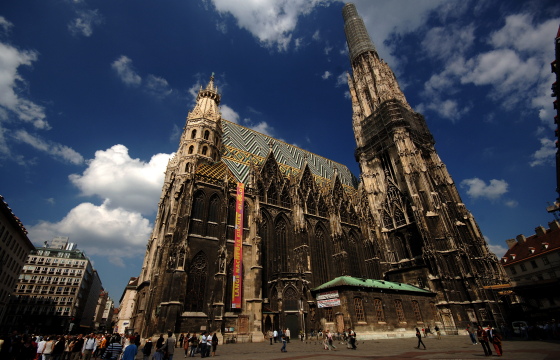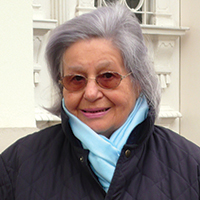Christa Pongratz-Lippitt from Vienna
Vienna is not only synonymous with Strauss waltzes and cosy cafés - where one can still sit all day with a single cup of coffee reading magazines and newspapers from all over the world. It is also a centre of international dialogue and espionage in the heart of Europe and an important information exchange hub.
Traditionally, Vienna has served as an international platform for various dialogue initiatives for years and at the moment hosts eight interreligious dialogue forums. Press agencies therefore play an important role in Vienna and there are probably few cities in Europe, with the exception, of course, of the Vatican, where the Catholic media play such a prominent role.
This is largely due to the efficiency of the Austrian Catholic Press Agency Kathpress. Since it was founded 70 years ago, it has become an indispensable source of information on Christian positions and commitment in society far beyond Austria’s borders and those of its neighbours.
It so happens that Kathpress’s 70th anniversary coincides with the 30th anniversary of my appointment as The Tablet’s Vienna correspondent.
In the spring of 1987, I received a letter from Christopher Herdon, an old friend from our Foreign Office days, asking me whether I would like to write for The Tablet, which, as fellow Catholics from birth, we both knew well, particularly from our days at Oxford. It would not be much work, Christopher said, “just the occasional report from time to time if anything really important happens in Austria - ike a papal visit, for instance. But the first thing you must do is take out a subscription to the Austrian Catholic Press Agency.”
I obediently subscribed right away and began to receive Kathpress reports regularly – in those days, of course, by post. From the very beginning, when I first began to set up a network of reliable sources, Kathpress gave me a helping hand and has been an invaluable source of information ever since, for which I am deeply grateful. On its 70th birthday, therefore, one can only most sincerely wish it Many Happy Returns!
Kathpress was founded as the “Catholic Press Centre” in November 1946 under the allied occupation of Austria after the Second World War and it was taken over by the Austrian bishops’ conference in 1951. It is still published by the bishops’ conference today and, aside from its function as a news agency, it is also the bishops’ conference’s press office.
Shortly before the Second Vatican Council (1962-5), the Austrian, German, Swiss, Belgian and Dutch Catholic press agencies opened a Catholic information centre in Rome called the “Centrum Informationem Catholicum”, better known as CIC. Today’s close cooperation between the Austrian, German and Swiss Catholic press agencies goes back to the CIC. Kathpress also has correspondents in the Czech Republic, Slovakia, Hungary, Croatia and Bosnia-Herzegovina. Two to three times a year, a group from the editorial team in Vienna go on fact-finding missions to Eastern Europe or further afield to the Middle East.
There is no doubt that the important role the Church still plays in the Austrian media goes back to the influence of the late Cardinal Franz König, Archbishop of Vienna from 1956 to 1986. Before he set out for Rome on the eve of the Council, König told Austrian Catholic journalists that they should not wait to ask their bishops, but should inform the world of what was being said at the Council and should not hesitate to criticise or press for answers whenever they thought necessary. It was their duty in the interest of both parties, he emphasised, to get the Church and the world to engage in dialogue.
“Journalists who grasped overall connections quickly but also had a gift for asking the Church and the world the right questions at the right time and then commented critically, did a wonderful job at the Council and set an excellent example”, König commented after the Council was over. Catholic journalists in Austria have never forgotten the cardinal’s advice and have continued to comment critically.
Question time after bishops’ conference press conferences – which are organised by Kathpress – are lively events and can be turbulent in times of church crises. Held in the press conference room right behind St Stephen’s Cathedral – but sometimes also up in the attics of the cathedral itself with journalists sitting on the huge beams instead of chairs, they can be full to bursting with journalists sitting on the floor amid the TV camera wiring.

Stephansdom - St Stephen's Cathedral - in Vienna is home to some lively Catholic press conferences
One has only to think back to the Groer Affair in the mid-90s, when Cardinal Hans Hermann Groer, who was Archbishop of Vienna at the time, was accused of having abused a minor and had to resign; of Bishop Kurt Krenn’s resignation as Bishop of Sankt Pölten in 2004 over a child pornography scandal at his seminary; and of the clergy sex abuse “tsunami”, to use Cardinal Christoph Schönborn’s expression for it, that swept over Austria and the German-speaking countries in 2010, to realise that the Austrian Church has been shaken by a number of really serious crises in the past 30 years, all of which have made world headlines. I have therefore witnessed some pretty tumultuous question times.
Despite these crises and increasing secularisation, however, Vienna – and the whole of Austria – are still steeped in Catholic tradition.
On 5 December, St Nicholas still visits most kindergartens in Vienna with presents for all the children, many of whom are no longer Catholic nowadays. At All Saints on 1 November, which, like all the main Catholic Holy days of Obligation, is a public holiday in Austria, the Vienna municipal council organises extra public transport to the main cemeteries. The Viennese have a melancholy side to them and a veritable fascination with death and graveyards. Many Viennese families still tend their graves with meticulous care and, armed with baskets of seedlings, gardening tools and watering cans, regularly set out for the graveyards of their loved ones: often a plot where they too will make their final resting place, often at not inconsiderable expense.
In the courts and in many state hospitals crosses still hang on the walls, to the great surprise of visitors from abroad.
In a recent poll, 80 per cent of Austrians said they wanted Austria to remain a Christian country. Of its 13 annual public holidays, 11 are Catholic Holy days of Obligation. In spring or early summer depending on the date of Easter, Austrians can look forward to the following holidays: A long weekend at Easter as Easter Monday is a holiday; then Labour Day on 1 May which is a state holiday; then a really long weekend (from Wednesday evening until Monday morning) at Ascension which is still kept on a Thursday, and the Friday is usually worked in; then another long weekend at Pentecost as Pentecost Monday is a public holiday and finally another four-day weekend for Corpus Christi which is also always kept on a Thursday. That is 15 days off work within a matter of a few weeks - on full pay. The mere suggestion that some of these public holidays, like Easter or Pentecost Monday, could possibly be dispensed with for economic reasons, immediately leads to a public outcry not only on the part of the Church but also of the trade unions and, of course, the general public of all faiths and none. It does mean, however, that unlike in other countries, everyone who lives in Austria regardless of whether they are believers or not know when Pentecost, Ascension Day and Corpus Christi are. Only foreign tourists are often surprised to find that all shops are closed and that there are no newspapers on all these public holidays.
Kathpress’s 70th birthday party was celebrated with due honour by 250 invited guests. Fr Federico Lombardi, the former Director of the Holy See’s Press Office, was the keynote speaker. He described his work under St John Paul II, Pope Emeritus Benedict XVI and Pope Francis. Cardinal Schönborn underlined that in times of so-called "fake news" it was all-important for Catholic journalists constantly to remember the eighth commandment: “You shall not bear false witness against your neighbour.” In other words, Schönborn said, they should not lie. The World Church with its network of dioceses, parishes and communities, was a huge source of information and sending this news out into the world was a “great opportunity, a huge aspiration and a highly political task”, he emphasised.
Vienna, with its position in the heart of Europe and its long history as a gateway to the east, is likely to remain an indispensable source of religious news, especially as it hosts so many international, religious and humanitarian congresses and dialogue centres.



 Loading ...
Loading ...
What do you think?
You can post as a subscriber user ...
User comments (0)